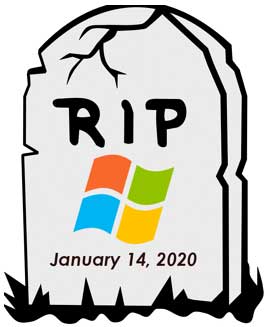Windows 7 support - Jan 14, 2020
Windows 7 support - Jan 14, 2020 | Tech Tips Article by PcCG
January 14, 2020 is the final day! Windows 7 will be retired after a decade of service.
What does this mean for those still using Windows 7? Will your computer suddenly stop working? Is the world going to come crashing down? Here’s the answer: Nothing. Your computer will work just fine on January 15th, 2020. In fact you can still expect to get good use out of it for another 6 months to 2 years.
What really is happening on January 14th is Microsoft will no longer release security updates for Windows 7. However if you have a good security suite – you should be fine.
The exception is for business’ that have sensitive information stored such as doctor’s offices and accounting firms. In these cases not upgrading may pose a substantial legal risk.
Most people running Windows 7 will be running it on older hardware. Windows 10 will almost always run well on these older machines – but you also need to consider when the computer may be due for replacement. If you are likely to just replace the computer in the next year or two – then it’s probably best to hold off.
For the most part, Windows 10 is great. It’s fast, it doesn’t have many of the annoyances that Windows 8 had and brings some cool new things to the table. It’s very easy to get used to (moving from 7 to 10) – things are generally in about the same spot. In most cases you can use all the same applications you used in windows 7 as well.
You can pay for an upgrade to Windows 10 which typically works well, leaving all your stuff in the same place. The free upgrade is no longer – but you can still get Windows 10 for free (assuming you have your windows 7 or 8 license). The drawback is it usually means reloading your computer from scratch.
So there you have it. Your Windows 7 computer won’t die on January 14, 2020. You’ll still be able to get a good 6 months to 2 years out of it if you so desire! You will not be receiving security updates anymore but the risk of this is low for the average user.









